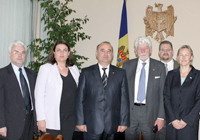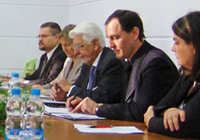
Professor Lars Kallings, the UN Secretary-General’s Special Envoy for HIV in Eastern Europe, last month visited the Republic of Moldova.
Professor Lars Kallings, the UN Secretary-General’s Special Envoy for HIV in Eastern Europe, last month visited the Republic of Moldova. During his visit, which coincided with United Nations Day, he emphasized the importance of agencies joining their efforts for a more effective HIV response with enhanced visibility and impact. In a series of meetings Professor Kallings met with the Deputy Prime Minister as well as the Minister of Health, Social Protection, Family and Child and Minister of Education and Youth.
Professor Kallings welcomed the Government of Moldova’s commitments and efforts in the AIDS response and reaffirmed the UN commitment to provide technical support to strengthen the capacity of the Government, trade unions, business and civil society organizations in the national response to AIDS.
During his advocacy mission, he took the opportunity to discuss the following priorities with government officials:
1. Review of legislative framework, with a focus on amending the law on HIV prevention and control of HIV which was adopted in 2007. While largely consistent with human rights standards, it contains certain discriminatory provisions which may limit freedom of movement.
2. Greater sustainability of the efforts in the context of the national AIDS response through increasing contributions from the state budget and institutionalizing mechanisms for improved management of financial resources and better resource needs estimations
3. Scaling-up efforts on HIV prevention based on a strategic framework for clearer focus on results, better accountability and enhanced coordination, with a definite focus on youth, targeted through health education institutionalized in the school curricula
4. Improved inter-sectoral coordination in the national response to HIV, and better involvement of key Ministries like the Ministry of Education and Youth and Ministry of Finance He also held discussions with representatives from the private sector, civil society and international organizations
HIV in Moldova

The Republic of Moldova is classified as a low prevalence country with HIV more likely impacting key populations including people who inject drugs
The Republic of Moldova is classified as a low prevalence country with HIV more likely impacting key populations including people who inject drugs. However there are signs of HIV spreading into the general population as unprotected sex is an increasing mode of transmission in Moldova. According to the World Bank, Moldova, as a proportion of the population, is one of the largest emigration countries in the world. Large-scale emigration by people in search of work, particularly to neighbouring countries like Russia and Ukraine mean there are many migrant workers who may be more vulnerable to HIV infection. Analysts think this may become a determinant in the future evolution of HIV in the Republic of Moldova.
The proportion of women among newly reported HIV cases with sexual route of transmission is also growing (62% in 2007, compared to 57% in 2006).
HIV prevention
Given these trends the UN Envoy emphasized the importance of HIV prevention among the general population for a successful response to AIDS.
“Efforts should be strengthened to reach every woman, every man, and every young person with general prevention information and behavior changing techniques, including HIV prevention programmes in schools and other education institutions and in the workplace,” stressed Professor Lars Kallings.
“Moldova is on the right track towards achieving the goals of the 2001 Declaration of Commitment on HIV/AIDS and the 2006 Political Declaration, and is in the fortunate position of still having a unique window of opportunity that if the HIV is recognized as the highest priority the effectiveness of the national response would be to the utmost and Moldova may become one of the countries in the region which would halt and revert the epidemic by 2015,” noted Dr Sergei Furgal, Director, a.i., UNAIDS Regional Support Team for Eastern Europe and Central Asia.





